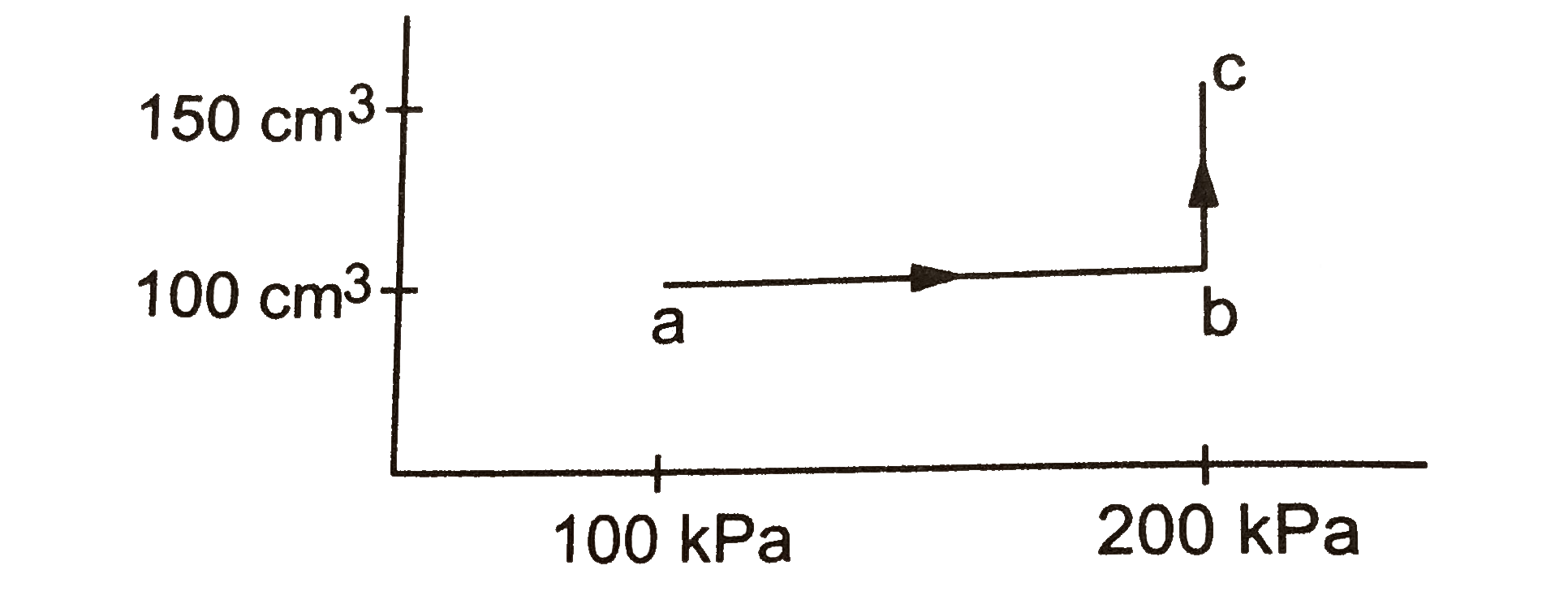In an isobaric heating process in which the temperature canges from 0∘C to 100∘C, a mole of an ideal gal absorbs Q=3.35kJ. Find: (a) the value of γ (b) the increment ΔU in the internal energy of the gas, (c) the work A done by the gas.
The correct Answer is:1.33,2.52kJ0.83kJ
Step by step video, text & image solution for In an isobaric heating process in which the temperature canges from 0^(@)C to 100^(@)C, a mole of an ideal gal absorbs Q=3.35kJ. Find: (a) the value of gamma (b) the increment DeltaU in the internal energy of the gas, (c) the work A done by the gas. by Physics experts to help you in doubts & scoring excellent marks in Class 11 exams.
Updated on:21/07/2023Topper's Solved these Questions
Similar Questions
A mole of an ideal gas initially at a temperature T1=290K expands isobarically until its volume increases 2 times. Next the gas is cooled isochorically to its initial temperature T1.Find (a) the incement ΔU in the internal energy of the gas, (b) the work A done by the gas (c) the amount of the heat Q received by the gas.
View SolutionA sample of ideal gas (γ=1.4) is heated at constant pressure. If 140J of heat is supplied to gas, find ΔU and W.
View Solution
Knowledge Check
The work done is heating one mole of an ideal gas at constant pressure from 15∘C to 25∘C is
A+19.87 calB−198.7 calC+198.7 calD−19.87 calFor an ideal gas,
(i) the change in internal energy in a constant pressure process from temperature T1 to T2 is equal to nCV(T2−T1), where CV is the molar heat capacity at constant volume and n is the number of moles of the gas
(ii) The change in internal enregy of the gas and the work done by the gas are equal in magnitude in an adiabatic process.
(iii) The internal energy does not change in an isothermal process. ltbr> (iv) no heat is added or removed in an adiabatic processA(i),(iii)B(ii),(iii)C(iii),(iv)Dall3.0 moles of ideal gas is heated at constant pressure from 27∘C to 127∘C. Then the work expansion of gas is
A−2.494kJB+2.494kJC−10.5kJD+10.5kJ
If 70 cal of heat is required to raise the temperature of moles of an ideal gas at constant pressure from 30∘C to 35∘C, calculate (i) the work done by the gas (ii) the increases in internal energy of the gas and (iii) degrees of freedom of gas molecules. given R=2calmol−1K−1
View Solution(a) 2 moles of an ideas gas is heated at constant pressure so that its temperature increases from 27∘C to 127∘C. Find work done by the gas.
(b) In a process, the volume of gas increases from 1000 cc to 2000 cc at constant pressure 100 kPa. Find work done by the gas.
View SolutionAn ideal gas (γ=1.67) is taken through the process abc shown in figure . The temperature at the point a is 300k. Calculate (a) the temperature at b and c, (b) the work done in the process, ( c) the amount of heat supplied in the path ab and in the path bc and (d) the change in the internal energy of the gas in the process.

View SolutionAs a result of the isobaric heating by ΔT=72K, one mole of a certain ideal gas obtain an amount of heat Q=1.6kJ. Find the work performed by the gas, the increment of its internal energy and γ.
View SolutionAs a result of the isobaric heating by ΔT=72 K one mole of a certain ideal gas obtains an amount of heat Q = 1.60 kJ. Find the work performed by the gas, the increment of its internal energy, and the value of γ=Cp/Cv
View Solution

